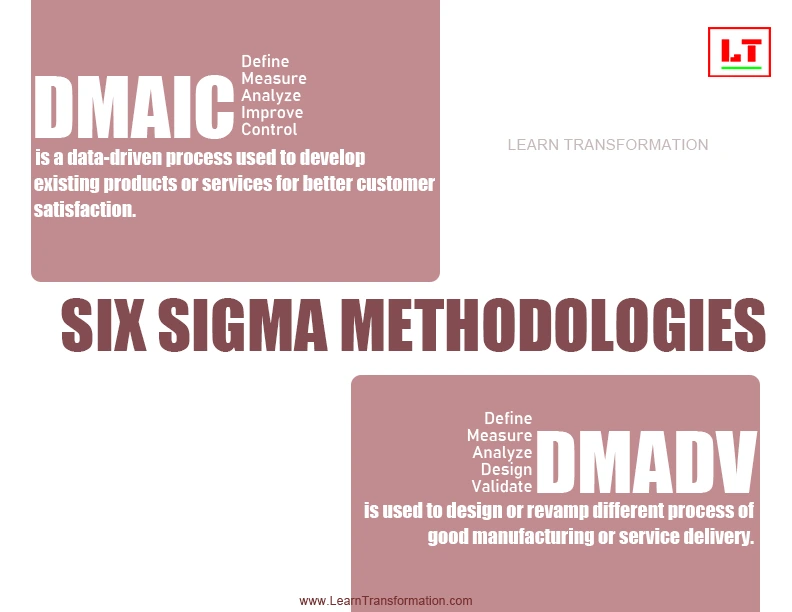“Excellence is the unlimited ability to improve the quality of what you have to offer.” –Rick Pitino
What is Six Sigma ?
The model was proposed by a scientist who worked at Motorola in 1986. The term Six Sigma consists of a set of quality-control tools that companies can use to remove faults and improve processes to help boost profits.
Six Sigma process is a management philosophy whose main focus is on statistical improvements to a business process and prefers qualitative measurements of success over qualitative. This is based on the Greek symbol “sigma” which is a statistical term for measuring deviation from the process mean or target.
Six-Sigma has grown into a more general business-management philosophy, which is focused on meeting customer requirements, customer satisfaction, improving customer retention, and constantly improving business products and services.
Anyone can obtain Six-Sigma certification, which solidify and verify their professional skills. Six sigma certificates are awarded through a belt system similar to karate training.
👉 Hand picked for you – Top 100 Famous Lean Six Sigma Quotes
Principles of Six-Sigma
The concept of Six Sigma methodology has a simple goal i.e. deliver near-perfect goods and services for business revolution and customer satisfaction. It has five key principles.
1. Focus on the customer:
A business needs to understand its customers, their requirements, and what is needed to make them long term advocates of the good or service. This requires maintaining the quality standard as defined by the customer or market demands. Basically the primary goal is to satisfy the customer.
2. Finding the problem:
Collect and analyze the data to discover specific problem area that requires to be assessed and transformed. Have clearly defined goals before data collection, including defining the data, reason for data collection, insight anticipated and accuracy of measurements, and establishing a standardized data collection system.
3. Removing the defects:
Once the problem is identified, make changes to the process to eradicate variation, thus removing defects.
Leader’s Tip
Foster a data-driven culture by emphasizing the importance of accurate measurement, analysis and evidence-based decision making.
4. Continuing the process:
Six Sigma processes have a great impact on an organization, and the team has to be capable in the principles and methodologies used. So dedicated training and knowledge are required to reduce the risk of project or revamp failures and ensure that the process is performed positively.
5. Flexible and responsive ecosystem:
The people and departments involved should be flexible enough to adapt to the change with ease, and to facilitate this, processes should be structured for quick and flawless implementation. Ultimately, the businesses that have an eye fixed on the data, inspect the bottom line at times and adjust their processes where necessary and thus can gain a competitive edge.
👉 Hand picked for you – TQM (Total Quality Management) in VUCA World

What are Six Sigma methodologies?
There are two main six-sigma methodologies which are DMAIC and DMADV. Let us understand them in detail.
- DMAIC is a data-driven process used to develop existing products or services for better customer satisfaction. It stands for Define, Measure, Analyze, Improve, and Control. DMAIC is useful in the manufacturing of a good or delivery of a service.
- DMADV is a part of the Design for Six Sigma (DFSS) process used to design or revamp different processes of good manufacturing or service delivery. It stands for Define, Measure, Analyze, Design, Validate. DMADV is engaged when already existing processes do not meet customer satisfaction levels, even after optimization.
The two methodologies are used in different business scenarios, and professionals seeking to master these methods and application scenarios should do an online certificate program taught by industry experts.
Leader’s Tip
Provide employees with comprehensive training and support to increase their knowledge and expertise in Six Sigma tools and methodologies.
👉 Read also: 6 Best Protein Powder For Weight Loss in 2023
Six-Sigma is a proven method of adding value and ensuring quality to the output of a business in the form of incremental improvements to a product or a service. It is also used to optimize the supply chain process and enhance customer satisfaction.
Six-Sigma is a proactive methodology that identifies and provides solutions for potential problems before the company incurs any loss. Six-Sigma can be applied in several categories within a business, directly impacting profitability and reducing costs.
Frequently Asked Questions (FAQs)
What is 6 sigma concept ?
The model was proposed by a scientist who worked at Motorola in 1986. The term Six Sigma consists of a set of quality-control tools that companies can use to remove faults and improve processes to help boost profits.
What are Six Sigma methodologies?
There are two main six sigma methodologies which are DMAIC and DMADV.
What is Six Sigma 5 principles ?
Six sigma has five key principles: Focus on the customer, Finding the problem, Removing the defects, Continuing the process, Flexible and responsive ecosystem.
What are 6 Sigma tools ?
Six Sigma has grown into a more general business-management philosophy, which is focused on meeting customer requirements, customer satisfaction, improving customer retention, and constantly improving business products and services. Anyone can obtain Six-Sigma certification, which solidify and verify their professional skills. The certificates are awarded through a belt system similar to karate training.
Key Takeaways
- Key principles of Six Sigma include customer centricity, data-driven decision-making, process optimization, and continuous improvement.
- The DMAIC (Define, Measure, Analyze, Improve, Control) methodology is commonly used in Six Sigma to guide problem-solving and process improvement efforts.
- Successful implementation of Six Sigma requires strong leadership support, employee engagement, and a systematic approach to achieving measurable results and delivering superior quality.

